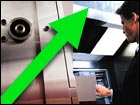
NEW YORK (CNN/Money) -
Citigroup missed estimates. Bank of America beat them. But investing in bank stocks is not that simple.
Big banks face a host of issues right now. Concerns that more corporate loans will go bad (think Enron). Worries about what impact rising interest rates may have on earnings. And questions about exposure to struggling economies. (For more on Citigroup and Bank of America's earnings, click here.)
But overall, the sector looks good.
Strong consumer banking growth for Citi and BofA
Despite the miss, Citi's results weren't bad at all. Citigroup (C: Research, Estimates) didn't hit its earnings targets because it took a $519 million after-tax charge to reflect the reduced value of assets in Argentina. That lowered earnings by ten cents a share. The bulk of the charge was attributed to an addition to Citigroup's allowance against loan losses, a move that was viewed as a wise one.
"Citigroup obviously decided to bite the bullet on Argentina. The only reason they missed earnings was the decision to take additional charges. That seems to be a prudent thing to do," says Mike Stead, manager of the Wells Fargo SIFE Specialized Financial Services Fund.
Earnings from Citigroup's global consumer banking unit, which includes mortgage banking and credit cards, were actually up a healthy 26 percent. Global consumer banking accounted for more than half of the bank's profits in the first quarter.
In that respect, Citigroup's results were similar to Bank of America's. Thanks in part to a 59 percent surge in mortgage banking income, Bank of America's consumer and commercial banking profits increased by 11 percent.
Corporate loans getting less risky
What's even more encouraging is that neither bank reported a major credit blow-up. Several big banks were burned by Enron's bankruptcy in the fourth quarter of 2001. And although there were several other high profile bankruptcies in the first quarter (namely Kmart and Global Crossing) they did not appear to cause a dent in earnings for Citigroup or Bank of America (BAC: Research, Estimates).
This bodes well for the rest of the banking sector. FleetBoston Financial (FBF: Research, Estimates) and J.P. Morgan Chase (JPM: Research, Estimates), two banks that were hit hard by Argentina and Enron, respectively, last quarter are expected to report their first quarter results on Tuesday and Wednesday. FleetBoston has already told investors that it expects to meet Wall Street's estimate of 70 cents a share.
Steve Rayner, co-manager of the ING Financial Services Fund, says Bank of America gave an optimistic outlook regarding corporate credit quality. In short, as the economy continues to strengthen, there should be less risk of big corporate loan defaults and bankruptcies. Rayner says the telecom sector may still have some pitfalls for banks but for the most part he likes banks that have big commercial lending business, since they should benefit from improving credit quality.
"Larger banks that are more leveraged to corporate credits are looking a little better," he says. To that end, Citigroup, FleetBoston and Wells Fargo (WFC: Research, Estimates) were among the fund's top ten holdings as of Feb. 28.
Stead also thinks large banks with corporate credit exposure are good bets. Bank of America, J.P. Morgan Chase, Citigroup and Bank of New York are all top 10 holdings in his fund.
Take advantage of the pullback in the stocks
Most bank stocks however dipped on Monday. The Philadelphia Bank Index slipped 1.5 percent and even Bank of America fell 1.2 percent despite its upside surprise (for more on earnings surprises, click here). That spells opportunity, says Frank Barkocy, an analyst with hedge fund firm Keefe Partners.
Barkocy says banks had run up in recent months on the anticipation of decent first quarter earnings. The Philadelphia Bank Index, for example, has increased more than 13 percent since mid February. But valuations for the big banks are still reasonable.
Citigroup, for example, is trading at 14 times estimated 2002 earnings and earnings are expected to increase by an average of 15 percent a year over the next three to five years. Bank of America trades at just 12.3 times 2002 earnings estimates. Analysts are predicting earnings growth of 10 percent annually over the next three to five years.
One potential negative for the sector is speculation that the Fed might raise rates at its next meeting in May or at the one following that in June. Typically, banks get sold off after the Fed raises rates because investors fear reduced demand for loans will put a crimp in earnings. But Rayner calls it a knee-jerk reaction that is unjustified for most larger banks since they have enough financial hedges in place to mitigate the impact higher rates may have on rate-sensitive businesses. In addition, he doesn't see rates rising so much as to cause a precipitous drop in loan volume.
And as long as rates remain relatively low, banks should be able to continue posting earnings gains of about 10 percent. Barkocy says the Fed will probably hold off on raising rates until the end of the third quarter at the earliest. "In that environment banks should do well psychologically as well as fundamentally," Barkocy says.

|

